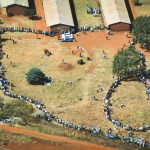SECTION27 OP-ED
How a working democracy can ensure state accountability in school feeding programme failures

The school feeding scheme saga in KwaZulu-Natal is a lesson in how making our democracy work can bolster state accountability.
During the Covid-19 pandemic, the National School Nutrition Scheme (NSNP), a crucial poverty alleviation mechanism, was suspended. A 2020 court judgment held that the suspension infringed several children’s rights because it increased child hunger and exacerbated food insecurity in poor households. In recent weeks, the NSNP has been floundering in KwaZulu-Natal (KZN) and the Eastern Cape. However, given the heightened awareness of the crucial role of the NSNP, civil society, the media and even the scrutiny by the national and provincial legislatures are ensuring there is pressure on the state to account for the most recent system failures.
Initiated in 1994, the NSNP is a state-funded feeding scheme designed to help our most vulnerable children by providing nutritious school meals to pupils in quintile 1 to 3 public schools – the poorest 60% of schools in our country – as well as to certain quintile 4 and 5 schools. Currently, the NSNP provides meals to about 9.6 million pupils across South Africa and is deservingly hailed as one of the state’s most effective “pro-poor” initiatives implemented to achieve substantive equality in schools by alleviating hunger.
Studies worldwide illustrate that school feeding programmes can also improve school enrolment, learner performance and enhance learners’ cognitive abilities by providing better nutrition. Well-nourished children simply learn better and the NSNP plays a critical role as it supplements the nutrition of half of all children in the country.
In 2020, during the Covid-19 pandemic, the NSNP came to a grinding halt when school meals were no longer offered as children studied remotely, leaving millions hungry at home. In response, public interest organisations SECTION27, Equal Education, the Equal Education Law Centre, together with the school governing bodies of Vhulaudzi Secondary School and Mashao High School, took the Department of Basic Education (DBE) and eight members of the executive council (MECs) to court for their failure to provide school meals. In its judgment, the court held that both the minister of basic education and MECs have a constitutional and statutory duty to provide basic nutrition in terms of section 28(1)(c) and section 29(1)(a) of the Constitution, which protects children’s rights to basic nutrition and basic education respectively. The court therefore affirmed that the NSNP is an essential component of these rights and placed the responsibility to provide meals to learners every school day solely at the feet of the DBE and its provincial departments.
These entities are now floundering in this obligation in the two provinces.
Read more in Daily Maverick: KZN schools send hungry pupils home as National School Nutrition Programme fails to deliver
In KZN, learners returned to school to begin the second semester, only to be left hungry as about 500 schools across the province were not able to properly deliver meals after the Easter break. The fiasco stems from the KZN department of education’s (KZN DoE) recent decision to centralise the procurement of goods needed for the provision of NSNP meals.
In January 2023, the KZN DoE awarded a tender to Pacina Retail (PTY) Ltd, which was appointed to be the sole supplier of goods for the school meal programme in the province and would also be responsible for delivering pre-packaged goods at particular collection points. This was a marked departure from the department’s previous procurement system, which used a range of individual service providers that procured goods from retailers, warehouses and cash-and-carries, and supplied these to individual schools. When Pacina Retail failed to deliver any goods on the first day of the second school term, it marked the start of two disastrous weeks of poor service delivery, culminating in the withdrawal of Pacina Retail as a service provider on 26 April 2023.
Since then, and in response to a public outcry, the KZN DoE has taken measures to ensure the resumption of daily meals at schools. In a meeting held by the national Portfolio Committee on Basic Education on 2 May 2023, the KZN DoE assured that it had returned to its previous method of procurement and that the majority of schools were now able to provide an NSNP meal to learners.
In the wake of this saga, reports of the KZN DoE’s failure to provide NSNP meals were found on online and TV news platforms, radio shows, Facebook and Twitter, with statements emanating from civil society as well as entities such as the KZN Service Providers Forum, teachers’ unions, the National Association of School Governing Bodies in KZN, the KZN Nutrition Business Forum and political parties. Local municipalities, such as Umngeni and uMlalazi, also reported the challenges on their Facebook pages and intervened to assist schools with meals. SECTION27 had also written to the DBE requesting information on the reasons for the failure to deliver the NSNP to KZN schools.
Importantly, the KZN DoE’s failure also attracted parliamentary attention and prompted the KZN legislature’s education portfolio committee to conduct unannounced oversight visits to schools in different education districts to determine whether the NSNP had resumed.
It is imperative that the different structures call for a national investigation into the dysfunctional provisioning of the NSNP.
At a national level, a meeting was held by the national Portfolio Committee on Basic Education on 2 May 2023, in which the KZN DoE was called to account for the events that transpired and explain the steps being taken to ensure that learners were provided with NSNP meals as soon as possible. At this meeting, members of the Portfolio Committee levelled harsh criticism against the KZN DoE, interrogating, for example, why changes in the procurement process had taken place, what plans were in place to recover lost teaching and learning time and requiring that officials responsible for awarding such a massive contract to only one supplier be identified, and held responsible. Committee members also called for investigations to be made and requested that investigative reports be submitted to the committee.
During the meeting, one committee member noted critically that:
“we must all agree that this is a national disaster, it’s a calamity… One can honestly say the Department could have done better… That the learners in KZN had to be subjected to this kind of situation must be condemned with all possible terms at our disposal. We cannot justify what has just happened.”
There are currently also reports that thousands of schools in the Eastern Cape have not been providing school meals due to what appears to be a failure by the provincial department of education to transfer funds to schools and service providers. The problem in the Eastern Cape is also alleged to be much larger than in KZN, with close to 5,000 schools affected throughout the province. It is hoped that similar pressure will now be put on provincial and national authorities to remedy the problem in that province.
Persisting problem
This is not the first time procurement issues have interfered with the provision of the NSNP. Annual reports from 2018/19 show that schools in several provinces using the decentralised procurement model reported delays in the transfer of funds, which resulted in the non-delivery of NSNP meals when schools reopened. Quarterly provincial reports from the Eastern Cape in 2018 also showed that poor financial administration resulted in the withholding of NSNP funds, resulting in 34,320 learners in 167 Eastern Cape schools not receiving meals. Notably, these reports of non-provision due to procurement were made just before the Covid-19 pandemic and related lockdowns. Since a different system was in place between 2020 and 2022, one can deduce that procurement-related issues are a persisting problem in the provision of NSNP, even under ordinary circumstances.
Read more in Daily Maverick: Probe into Eastern Cape school nutrition scheme funding delays that left more than a million learners hungry
The KZN saga is a lesson in how making our democracy work can bolster state accountability.
The national and KZN legislature which called the KZN DoE to account, illustrate precisely how the principle of the separation of powers should and could operate, given the daily governance failures impacting on the quality of lives of all South Africans. According to this principle, state power is distributed between three branches of government: the Judiciary (courts), the Legislature (Parliament, provincial legislatures and local councils) and the Executive (the President, deputy president and ministers). This distribution of power is meant to ensure that each branch oversees the others, thereby enhancing accountability and protecting our democracy.
The media and civil society serve as a fourth tier of a functioning democracy. Civil society acts as a counterbalance to state power by ensuring that the state fulfils its obligations, while the media acts as a watchdog by exposing corruption and/or inaction. These roles are even more important within the context of the one-party dominance that has prevailed since 1994, together with the daily acceleration of systemic governance dysfunctions.
Finally, it is imperative that the different structures call for a national investigation into the dysfunctional provisioning of the NSNP. Among other issues, we need to determine whether other provinces are experiencing problems; what system of food supply would best serve each of the nine provinces; and whether procurement practices are in accordance with the Public Finance Management Act. DM/MC




















 Become an Insider
Become an Insider
Comments - Please login in order to comment.